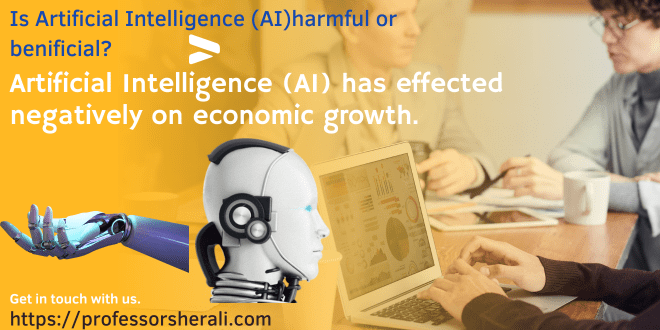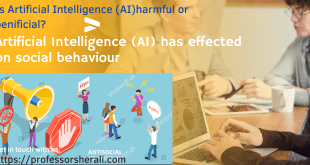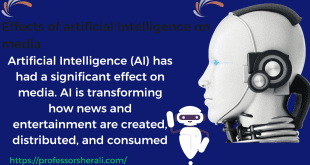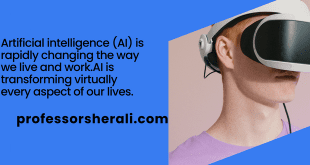Artificial Intelligence (AI) has effected negatively on economic growth. It has also revolutionized many aspects of our lives and transformed various industries. However, the widespread adoption of AI is not without its negative consequences, especially on economic growth. It happens AI effects on economic growth. There are many effects of AI on economic growth. In this article, we will explore some of the effects of AI on economic growth.
Job Displacement
One of the most significant negative effects of AI on economic growth is job displacement. As AI becomes more advanced and widespread, it can automate tasks that were previously done by humans. This automation can lead to job losses and unemployment, especially for low-skilled workers. Furthermore, the cost of retraining these workers is important, and not all workers may have the necessary skills to transition to new jobs. This job displacement can lead to a decrease in consumer spending. Which can ultimately harm economic growth.
Inequality
AI negatively effects on economic growth. Effects of AI on economic growth are dangerous and increase inequality by favoring those who have access to the technology and the skills needed to use it. This can lead to a concentration of wealth and power in the hands of a few, which can harm economic growth in the long run. Moreover, the automation of jobs can affect certain groups. These groups, such as women and minorities, who are already marginalized in the labor market. This can lead to social unrest, which can harm the overall economy.

Lack of Creativity and Innovation
Another negative effect of AI on economic growth is the potential lack of creativity and innovation. While AI can automate many routine tasks, it cannot replicate the human creativity and ingenuity that drive innovation and effect on economic growth. If AI rely on too heavily, it may stifle creativity and innovation, which critically drives economic growth. Moreover, the development and adoption of AI may require significant investments. It divert resources away from other areas of research and development.
Cybersecurity Risks
AI can also pose significant cybersecurity risks, which can harm economic growth. As AI becomes more widespread, it can become a target for cyberattacks, and the consequences of a successful attack can attack severely. Moreover, AI can launch cyberattacks, which can disrupt critical infrastructure and harm the overall economy. Cyber security is important and effect on economic growth. As such, the adoption of AI must be accompanied by robust cybersecurity measures to protect against these risks.
Dependence on AI
Another potential negative effect of AI on economic growth is the risk of dependence on AI. As more and more tasks become automated. It can become difficult to revert to manual processes if something goes wrong with the AI systems. Moreover, if AI systems are not properly maintained or updated, they may become obsolete, leading to significant disruptions in the economy. This dependence on AI can also create vulnerabilities in the supply chain, which can harm economic growth.
Data Privacy Concerns
AI relies heavily on data, and the collection and use of data can raise significant privacy concerns. The widespread adoption of AI can lead to the collection of vast amounts of personal data. That can be used to manipulate consumer behavior or make decisions that affect individuals’ lives. If individuals do not have control over their data, they may lose trust in the technology, which can harm economic growth. Moreover, data breaches and the mishandling of personal data can lead to significant economic costs and reputational damage for businesses and organizations.
Ethical Concerns
The use of AI can also raise significant ethical concerns, which can harm economic growth. For example, AI can be used to make decisions that affect people’s lives, such as credit scoring, hiring, and criminal justice. If AI systems are not designed and implemented ethically, they can perpetuate biases and discrimination, which can harm individuals and communities. Moreover, if the public loses trust in the technology due to ethical concerns, so AI effects on economic growth.
Lack of Accountability
Another potential negative effect of AI on economic growth is the lack of accountability. As AI becomes more autonomous and makes decisions that affect people’s lives, it can become challenging to determine who is responsible for the outcomes. This lack of accountability can lead to a lack of transparency, which can harm public trust in the technology. Moreover, if there are no clear lines of responsibility, it can be challenging to address issues when they arise, which can harm economic growth.
Regulatory Challenges
The widespread adoption of AI can also create significant regulatory challenges, which can harm economic growth. As AI becomes more advanced and widespread, it can be challenging to regulate and govern its use effectively. Moreover, if regulations are too strict, they can stifle innovation and harm economic growth. Conversely, if regulations are too lax, they can lead to ethical concerns, harm public trust, and harm economic growth.
Cultural Challenges
The adoption of AI can also face significant cultural challenges, which can harm economic growth. For example, some individuals and communities may resist the adoption of AI due to cultural or social norms. Moreover, the adoption of AI can lead to significant changes in the nature of work, which can be challenging for some individuals and communities to adapt to. If these cultural challenges are not addressed, they can lead to a lack of trust in the technology, harm economic growth, and create social unrest.
Conclusion
In conclusion, while AI has the potential to drive economic growth, it is not without its negative consequences. The job displacement, inequality, lack of creativity and innovation, cybersecurity risks, dependence on AI, data privacy concerns, ethical concerns, lack of accountability, regulatory challenges, and cultural challenges associated with AI can harm economic growth if not addressed. Therefore, policymakers and business leaders must carefully consider these potential negative effects and take steps to mitigate them while harnessing AI’s benefits. By doing so, we can ensure that AI contributes positively to economic growth and society as a whole.
 Professor Sher Ali My site
Professor Sher Ali My site



It is important to note that while AI does have some negative effects on economic growth, it also has numerous positive effects. For instance, AI can boost productivity, increase efficiency, and reduce costs, thereby promoting economic growth. Furthermore, the potential negative consequences of AI can be mitigated through effective policy and business strategies.
For instance, policymakers can invest in education and training programs to help workers acquire the skills needed to adapt to the changing job market. They can also develop regulations and ethical frameworks to ensure that AI is developed and deployed in a responsible and fair manner. Additionally, business leaders can prioritize cybersecurity measures and invest in data privacy protections to build trust with consumers and prevent economic harm.
In conclusion, while AI does have some negative effects on economic growth, policymakers and business leaders can take steps to mitigate these effects and harness AI’s benefits to drive economic growth.